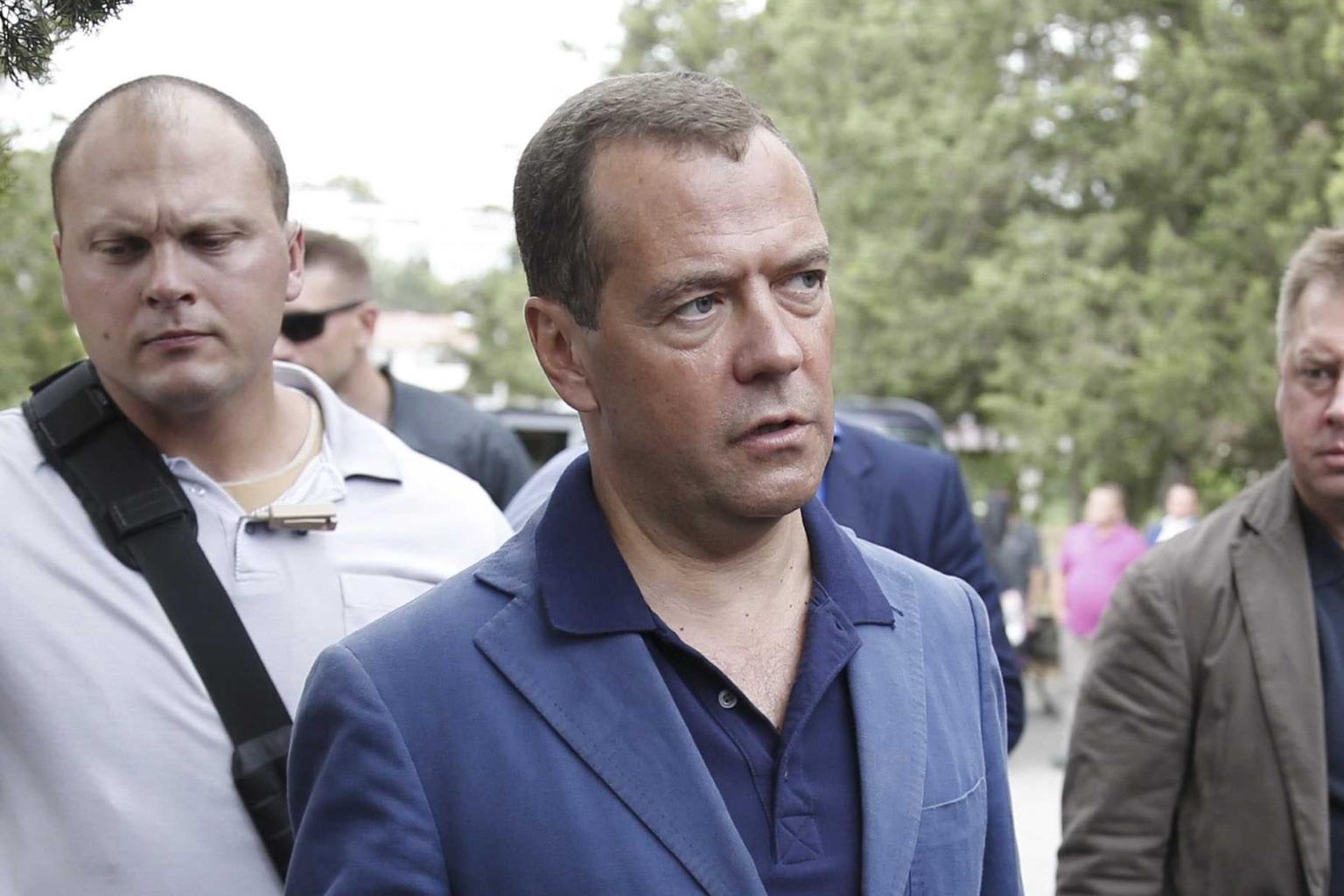Editorial Notes
Why is Moscow setting up a special zone in Shikotan island?: The Japan News
Sign up now: Get insights on Asia's fast-moving developments

Russian Prime Minister Dmitry Medvedev (centre) has signed a document that approves the establishment of a special economic zone in the Shakotan or Malokurilskoye district on Shikotan Island.
PHOTO: REUTERS
In its editorial on Aug 28, the paper says Russia's designation of special economic zone on Shikotan island cannot be overlooked.
TOKYO (THE JAPAN NEWS/ASIA NEWS NETWORK) - Russia's recent move absolutely cannot be overlooked because it is a unilateral action that runs counter to the spirit of joint economic activities contemplated by the governments of Japan and Russia.
Russian Prime Minister Dmitry Medvedev has signed a document that approves the establishment of a special economic zone in the Shakotan or Malokurilskoye district on Shikotan Island, one of Japan's four northern territories.
Russia plans to build a marine products processing factory in the designated zone.
Russia anticipates that the project will attract about 7.4 billion rubles (about S$171 million) in both domestic and foreign investment and create more than 700 jobs. Preferential treatment in terms of tax and other aspects will be reportedly given to firms taking part in the project.
A problematic point is that the special zone is premised on the application of Russia's domestic laws.
In conducting the joint economic activities, Japan calls for establishment of "a special framework" that would not undermine the legal position of Japan in regard to the right of taxation, police powers and so forth.
Russia's establishment of the special zone is obviously at variance with Japan's position.
In the Japan-Russia summit meeting held last December, an agreement was reached to aim for joint economic activities under "a special system." In vice-ministerial level talks held just last week, Tokyo and Moscow coordinated views on the content of projects in such areas as tourism and farming.
Russian Far East Development Minister Alexander Galushka justified the establishment of the special economic zone, saying, "We cannot stop efforts to improve the residents' livelihood until the results of the bilateral talks come out." It is feared Russia's latest move may destroy the bilateral relationship of trust that has been built in recent years.
Prime Minister Shinzo Abe is scheduled to meet with Russian President Vladimir Putin in Vladivostok early next month. Abe must tell him about Japan's concern steadfastly and call for rectifying the country's special zone system.
It is worrying that Russia shows an interest in investments not only from Japan but also from such countries as China and South Korea.
Already a South Korean firm is said to be taking part in a Shikotan Island port construction project. Russia's intention to also introduce foreign capital in the special zone for regional development is all too apparent.
Moscow also seems to be aiming to rattle Japan and draw concessions from it in negotiations on joint economic activities by weighing its options with Japan in comparison with China and South Korea. Such a method is a modus operandi of Russia.
The Japanese government must deal with the situation cool-headedly.
The authority to make final Russian government decisions on special zone projects and the territorial issue lies absolutely with Putin.
Ahead of the Russian presidential election set for next spring, Putin will not be able to make a political decision for the time being in connection with the territorial issue. On the other hand, Moscow has great hopes for bolstering economic relations with Japan amid the country's continued economic stagnation caused by U.S. and European sanctions, among other factors.
Putin, for his part, probably sufficiently recognises that if negotiations on joint economic activities fall through, it will become difficult for his country to obtain full-fledged economic cooperation from Japan.
Japan must make further efforts on various levels to more actively engage the Russian side over the issue.
The Japan News is a member of The Straits Times media partner Asia News Network, an alliance of 23 media entities.


